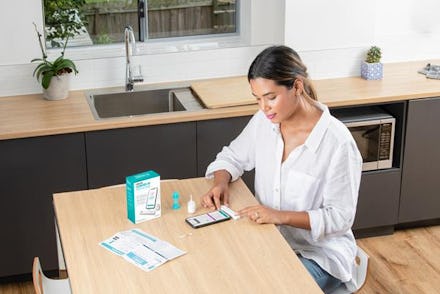The FDA just approved the first home coronavirus test. Here's how it works

Yesterday the FDA approved the first over-the-counter at-home rapid COVID-19 test, which is expected to be on major drugstore shelves in January, the Washington Post reported. The test is being hailed as a total game changer, but there are still a few strategic sticking points. Here’s what you need to know about what this new at-home test means for us all.
The test is made by the Australian company Ellume, and it is the first test approved by the FDA that can be taken at home and does not require a doctor’s prescription. Here’s how it works: You use a nasal swab to collect a sample from the inside of your nose and then put the sample on a plastic cartridge that looks similar to a home pregnancy test. The device connects to an app on your smartphone, which then communicates with a lab for analysis, and you get your results in as little as 15 minutes.
The Ellume app also automatically sends your results to the cloud by zip code to help local health officials with tracking COVID-19 rates, but your personal data (allegedly) stays confidential. You will also be able to automatically share your results with healthcare providers if you choose to, according to the Post. This all bodes well for helping us know how many people are sick and where they are.
This is not the first approved at-home rapid test. In November, the F.D.A approved another at-home test that doesn’t require results to be sent to a lab, but it’s $50, requires a doctor’s prescription, and it doesn’t do any of this tracking. That test, made by Lucira, has only initially been made available within the Sutter Health system in Florida and California, and isn’t expected to be available to the rest of us until spring, which makes Ellume’s test a potentially much more accessible option.
The ability of the Ellume test to both capture and report test results is crucial. A lot of companies have been trying to make at-home tests, but health officials feared that testing without tracking doesn’t give local healthcare systems the information it needs to provide adequate care. “Today’s authorization is a major milestone in diagnostic testing for COVID-19,” Stephen Hahn, the FDA Commissioner told The Washington Post. Hahn added that this will reduce the burden on laboratories, which have been overwhelmed for months.
The Ellume test will cost about $30, and an initial supply of 100,000 tests will be available within a few weeks. Ellume’s chief executive, Sean Parsons, told the Post that their company will manufacture about a million tests by the middle of 2021 and that they will be carried at a major retailer, which is as yet unnamed, but is presumed to be one of the drugstore giants. Parsons also said that Ellume is in talks to supply the test directly to businesses and schools.
This all sounds great, but how accurate is this test? So far, all I trust is the P.C.R. test — otherwise known as the Very Unpleasant Brain Tickler — that doctors trust to be the most accurate.
Ellume’s is an antigen test — which looks for proteins that the novel coronavirus leaves in your body — as opposed to a P.C.R test, which looks for the virus’s genetic material. Still, the former does seem to be pretty accurate; in a clinical study of 198 people, Ellume’s test was able to detect 95 percent of the coronavirus infections found by P.C.R., even if those people were asymptomatic
This is the kind of quick and easy testing we’ve all been waiting for, right? What’s the catch? Well, the catch is that $30 is a drop in the bucket for some and a high ticket price for others this rapid test may not make it to the people who need it most. Also, tests only you whether you are contagious in the moment you take them. That may seem obvious, but a lot of people seem to have developed the fantasy that being tested protects you and others from getting sick. It doesn’t. This test will be a great thing to have on hand, but it doesn’t mean that you don’t have to wear a mask.